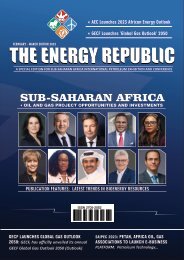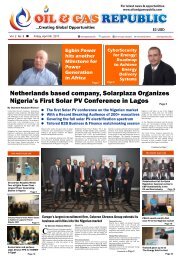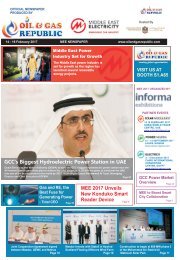The Energy Republic July Edition 2022
This magazine is a Special Edition focused on the NOG Conference and Exhibition 2022. The Nigeria oil and gas industry is undergoing a transformation following the recent policy enactment such as the Petroleum Industry Act (PIA) and ‘Decade of Gas Initiatives’ led by the Federal Government of Nigeria. This years’ NOG Conference features world-class conference programmes, including panel sessions to enable industry stakeholders, players and government discuss strategies in funding Nigerian energy mix going forward. In this edition, we featured an exclusive interview with H.E Chief Timipre Slyva, Honourable Minister of State for Petroleum Resources, including stakeholders and experts commentaries which are aligned based on the global trends in the energy, oil and gas industry. For general inquiries, please email us at: info@theenergyrepublic.com
This magazine is a Special Edition focused on the NOG Conference and Exhibition 2022. The Nigeria oil and gas industry is undergoing a transformation following the recent policy enactment such as the Petroleum Industry Act (PIA) and ‘Decade of Gas Initiatives’ led by the Federal Government of Nigeria. This years’ NOG Conference features world-class conference programmes, including panel sessions to enable industry stakeholders, players and government discuss strategies in funding Nigerian energy mix going forward.
In this edition, we featured an exclusive interview with H.E Chief Timipre Slyva, Honourable Minister of State for Petroleum Resources, including stakeholders and experts commentaries which are aligned based on the global trends in the energy, oil and gas industry.
For general inquiries, please email us at: info@theenergyrepublic.com
You also want an ePaper? Increase the reach of your titles
YUMPU automatically turns print PDFs into web optimized ePapers that Google loves.
NUPRC INTERVIEW
‘NUPRC Adopting a 'Phase-Down' Approach in Utilizing Nigeria's
Energy Resources'
In this interview, The Energy Republic talks
to Michael Benedict Edem, Mechanical
Engineer of Nigerian Upstream Petroleum
Regulatory Commission (NUPRC), about
the Commission's New Business Model in
driving natural gas development in
Nigeria. Interview: By Ndubuisi Micheal
Obineme.
TER: Please tell us about yourself and your
work at NUPRC.
Michael: My name is Michael Benedict
Edem and I am a graduate of Mechanical
Engineering (First Class Honors) from the
University of Port Harcourt. I am a registered
engineer in the Council for the Regulation of
Engineering in Nigeria (COREN), a member
of the Society of Petroleum Engineers (SPE),
Nigerian Association For Energy Economics
(NAEE), and the Nigerian Gas Association
(NGA). I worked briefly for Ernst & Young
Nigeria as a Tax Associate before joining the
Nigerian Upstream Petroleum Regulatory
Commission, formerly the Department of
Petroleum Resources.
The NUPRC is the technical and commercial
regulator of the upstream petroleum sector
and is one of the new regulatory agencies
created by the Petroleum Industry Act in
2021. In NUPRC, I work in the Central
Electronic Licensing, Approval and
Permitting System (CELAPS) unit where my
job roles include integration of all licensing,
approval, and permitting portals to ensure
ease of access and administration, online
document verification for companies
applying for Oil and Gas Industry Service
Permit (OGISP), maintaining a compendium
of all our service instruments that provide
business opportunities, continuous
performance review and upgrade of all
licenses, approvals and permit platforms.
I am very passionate about the Nigerian
Government's efforts in monetizing natural
gas to accelerate economic development,
eliminate energy poverty and mitigate
climate change.
TER: How would you evaluate the Nigerian
gas potential with emphasis on NUPRC's
business model to drive natural gas
development in-country?
Michael: The primary responsibility of a
Regulator is to provide investment
opportunities to prospective investors by
46
Michael Benedict Edem, Mechanical Engineer, Nigerian Upstream Petroleum Regulatory Commission
creating a conducive business climate
through the effective implementation of
policies, laws, regulations, and other
innovations that will attract investments
into the country. The NUPRC strongly aligns
with this objective and has identified
natural gas as the driver for sustainable
economic growth and development in the
country.
Gas is gaining prominence in the world
because it is environmentally friendly and
has multiplier effects on several sectors of
the economy such as agriculture,
petrochemicals, power, etc. Nigeria has
huge gas potential with an estimated
208.62Tcf of proven gas reserves and 600Tcf
of reserves yet to be proven. Currently,
Nigeria is ranked 9th in the world in terms of
proven gas reserves and can become the 4th
highest just behind Qatar if the 600Tcf is
proved.
Nigeria's gas production is however about 8
billion standard cubic feet per day (Bscfd)
with 42.93% exported to Europe and
neighboring West African countries; 18.66%
consumed by the domestic market, 29.71%
used in-field for utility, gas lift, and pressure
maintenance and 8.70% was flared.
The NUPRC is very intentional in increasing
gas exploration and development through
the implementation of policies such as the
Nigerian Gas Flare Commercialization
Programme (NGFCP) to monetize flare gas,
mandating incorporation of gas utilization
strategies in Field Development Plans to
prevent routine gas flaring, allocation of
domestic gas delivery obligations to gas
producers to deepen gas penetration in the
domestic strategic sectors, ensuring
competitive pricing of natural gas to the
domestic market, providing quality data
from the National Data Repository (NDR) to
enhance gas exploration, developing cost
benchmarks for gas exploration and
development to ensure cost optimization
and implementation of the incentives in the
Petroleum Industry Act to attract
investments in gas development.
TER: What's NUPRC Energy Transition
Strategy?
Michael: The global energy transition is a
reality that affects us all, both in developing
and developed countries. Despite this
transition, fossil fuels will still be relevant in
the energy mix according to global energy
outlook reports by OPEC and GECF. Nigeria
is fully committed to the Paris Agreement
and has pledged to achieve a net-zero
carbon emission target by 2060.
However, this implementation process
would have to align with our strategic
national interest in energy security
THE ENERGY REPUBLIC I SPECIAL EDITION















